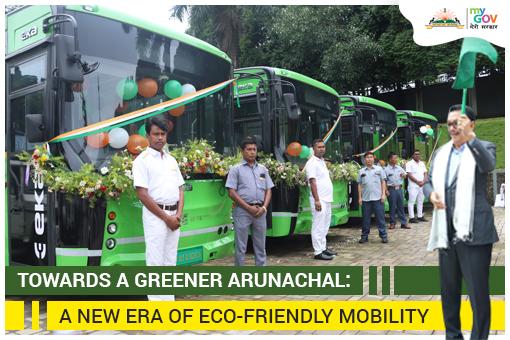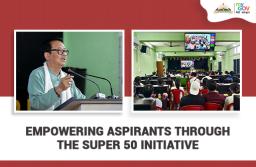On the occasion of World Environment Day, Hon’ble Deputy Chief Minister Chowna Mein flagged off a fleet of electric buses (e-Buses) from the State Banquet Hall, Itanagar. This significant initiative marks Arunachal Pradesh’s progressive step towards embracing clean, green, and sustainable public transportation.
The launch of electric buses reflects the state government's commitment to reducing carbon emissions, easing traffic pollution, and providing citizens with a more efficient and eco-conscious transport system.
These e-Buses are expected to not only reduce dependency on fossil fuels but also promote inclusive mobility, particularly in urban areas like Itanagar and Naharlagun, where population growth and vehicle congestion are on the rise. Moreover, this initiative aligns with India’s broader climate commitments and the vision of a Viksit Bharat (Developed India) that is both modern and environmentally responsible.
Join the Discussion on MyGov:
1. How can rural areas in Arunachal benefit from similar green mobility solutions?
2. What role should educational institutions and local youth play in promoting sustainable practices in transportation?
3. In what other sectors can Arunachal adopt eco-friendly innovations to lead by example?













BrahmDevYadav 6 months 2 weeks ago
पर्यावरण के प्रति जागरूकता बढ़ाने के लिए क्या करना चाहिए?
पर्यावरण के प्रति अधिक जागरूक बनने के सबसे प्रभावशाली तरीकों में से एक है अपने परिवहन को पर्यावरण के अनुकूल बनाना। हर यात्रा के लिए अपनी कार पर निर्भर रहने के बजाय, पैदल, साइकिल से या सार्वजनिक परिवहन का उपयोग करने पर विचार करें। ये विकल्प न केवल कार्बन उत्सर्जन को कम करते हैं, बल्कि स्वास्थ्य लाभ भी प्रदान करते हैं।
BrahmDevYadav 6 months 2 weeks ago
बच्चों को पर्यावरण जागरूक करने में समाज की कैसे मदद मिलेगी?
स्कूलों में वृक्षारोपण दिवस का आयोजन करें और बच्चों को सिखाएं कि पेड़ पर्यावरण के लिए क्यों महत्वपूर्ण हैं। बच्चों को उपयोग में न होने पर सभी उपकरण और लाइटें बंद करने के लिए प्रोत्साहित करें। बच्चों को यह सुनिश्चित करने के लिए प्रोत्साहित करें कि उपयोग के बाद नल ठीक से बंद हो जाएं, तथा पानी का कम से कम उपयोग करें।
BrahmDevYadav 6 months 2 weeks ago
छात्रों में पर्यावरण जागरूकता पैदा करने में शिक्षक की क्या भूमिका है?
संक्षेप में, शिक्षक विद्यार्थियों में पारिस्थितिक मुद्दों को समझने और आवश्यक कार्रवाई करने के लिए आवश्यक कौशल और योग्यताएँ विकसित करने में मदद करते हैं । शिक्षक अपने विद्यार्थियों में रचनात्मक, गतिशील, प्रभावी और कुशल पर्यावरण संरक्षण और प्रबंधन ज़िम्मेदारियों के बारे में जागरूकता विकसित करने में मदद करते हैं।
BrahmDevYadav 6 months 2 weeks ago
पर्यावरण जागरूकता विकसित करने में शिक्षा की क्या भूमिका है?
पर्यावरण शिक्षा प्रदान करना:-
विद्यार्थी विभिन्न पर्यावरणीय मुद्दों,जैसे जलवायु परिवर्तन, प्रदूषण और जैव विविधता हानि,के बारे में सीख सकते हैं। वे सतत विकास प्रथाओं और उनके पर्यावरणीय प्रभाव को कम करने के तरीकों के बारे में भी सीख सकते हैं।
BrahmDevYadav 6 months 2 weeks ago
पर्यावरण को बनाए रखने के लिए क्या करना चाहिए?
1. जब भी संभव हो सार्वजनिक परिवहन या पैदल/बाइक का उपयोग करें।
2. एक पेड़ लगाओ और उसकी देखभाल करो।
3. कम से कम एक प्राकृतिक उत्पाद का उपयोग करें।
4. बिजली बचाएं और ऊर्जा-कुशल प्रकाश व्यवस्था का उपयोग करें।
5. मांस का सेवन कम करें।
6. सिंगल-यूज़ प्लास्टिक से बचें।
BrahmDevYadav 6 months 2 weeks ago
पर्यावरण जागरूकता पैदा करने के लिए स्कूलों में कौन से क्लब बनाए जाते हैं?
स्कूलों में इको क्लब छात्रों को सार्थक पर्यावरणीय गतिविधियों और परियोजनाओं में भाग लेने और उन्हें अपनाने के लिए सशक्त बनाएंगे। यह एक ऐसा मंच है जिसके माध्यम से छात्र अपने माता-पिता और आस-पड़ोस के समुदायों को प्रभावित कर सकते हैं और उन्हें पर्यावरण के प्रति अच्छे व्यवहार को बढ़ावा देने के लिए प्रेरित कर सकते हैं।
BrahmDevYadav 6 months 2 weeks ago
पर्यावरण जागरूकता विकसित करने में शिक्षा की क्या भूमिका है?
पर्यावरण शिक्षा प्रदान करना:-
विद्यार्थी विभिन्न पर्यावरणीय मुद्दों, जैसे जलवायु परिवर्तन, प्रदूषण और जैव विविधता हानि, के बारे में सीख सकते हैं। वे सतत विकास प्रथाओं और उनके पर्यावरणीय प्रभाव को कम करने के तरीकों के बारे में भी सीख सकते हैं।
BrahmDevYadav 6 months 2 weeks ago
पर्यावरण जागरूकता का उद्देश्य क्या है?
पर्यावरण जागरूकता:पर्यावरण दिवस का मुख्य उद्देश्य प्रकृति की रक्षा के लिए जागरुकता को बढ़ाना आज विश्व पर्यावरण दिवस है। इसका मुख्य उद्देश्य प्रकृति की रक्षा के लिए लोगों के बीच जागरूकता बढ़ाना है। पर्यावरण जागरूकता को जगाने के लिए संयुक्त राष्ट्र द्वारा संचालित विश्व पर्यावरण दिवस दुनिया का सबसे बड़ा वार्षिक आयोजन है।
Andaluri Srinivas 6 months 2 weeks ago
High way is eWay
BrahmDevYadav 6 months 2 weeks ago
पर्यावरण जागरूकता के लिए कौन सी प्रतियोगिता आयोजित की जाती है?
ग्रीन ओलंपियाड एक प्रतियोगिता है जो छात्रों में पर्यावरण जागरूकता का परीक्षण करती है, इसमें जल, अपशिष्ट, ऊर्जा, वायु, कृषि, शहरी परिदृश्य, जैव विविधता, जलवायु परिवर्तन, और सतत विकास से संबंधित प्रश्न परीक्षा में शामिल किए जाते हैं।